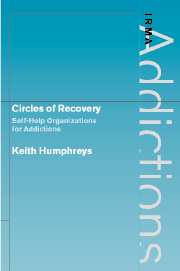Book contents
- Frontmatter
- Contents
- Acknowledgements
- 1 Definitions, scope, and origin of the health-related self-help group movement
- 2 An international tour of addiction-related mutual-help organizations
- 3 Does self-help group participation lead to positive addiction-related, psychiatric, and medical outcomes?
- 4 A different perspective on change in self-help organizations: spirituality, identity, life stories, friendship networks, and politicization
- 5 How should government agencies, healthcare organization, and clinicians interact with self-help organizations?
- Epilogue: summing up, moving forward
- References
- Index
3 - Does self-help group participation lead to positive addiction-related, psychiatric, and medical outcomes?
Published online by Cambridge University Press: 31 July 2009
- Frontmatter
- Contents
- Acknowledgements
- 1 Definitions, scope, and origin of the health-related self-help group movement
- 2 An international tour of addiction-related mutual-help organizations
- 3 Does self-help group participation lead to positive addiction-related, psychiatric, and medical outcomes?
- 4 A different perspective on change in self-help organizations: spirituality, identity, life stories, friendship networks, and politicization
- 5 How should government agencies, healthcare organization, and clinicians interact with self-help organizations?
- Epilogue: summing up, moving forward
- References
- Index
Summary
Conceptual background
Frederick Glaser and Alan Ogborne (1982) expressed a common sentiment when they said that what they “would most like to know” is whether addiction-related self-help groups “really work?” (cf. Leach, 1973). They focused upon AA, but the question has relevance to all self-help organizations. This chapter addresses the most common approach to answering this important question, namely asking whether self-help groups produce the same sorts of benefits one hopes for from professional addiction treatment programs, i.e., reduced substance use and lower associated psychiatric, social, and medical problems.
The case for evaluating whether addiction self-help groups “really work”
The need and warrant to evaluate publically funded and licensed healthcare organizations is self-evident. However, one might ask why scientists should attempt to evaluate the outcomes of participation in a voluntary social movement (Mäkelä, 1993). Self-help organizations do not compel attendance, do not seek any licensure or accreditation, and in most cases do not receive any public monies, so one might take the perspective that the “effectiveness” of self-help groups is no more pressing a question than the effectiveness of stamp-collecting clubs. If citizens choose to attend voluntary associations and find them beneficial and enjoyable, who are scientists to interfere or even to comment?
A social responsibility to evaluate putative helping interventions exists even when no public money or licensure is involved. Many self-help organizations make public claims of being able to help addicted people.
- Type
- Chapter
- Information
- Circles of RecoverySelf-Help Organizations for Addictions, pp. 94 - 127Publisher: Cambridge University PressPrint publication year: 2003

